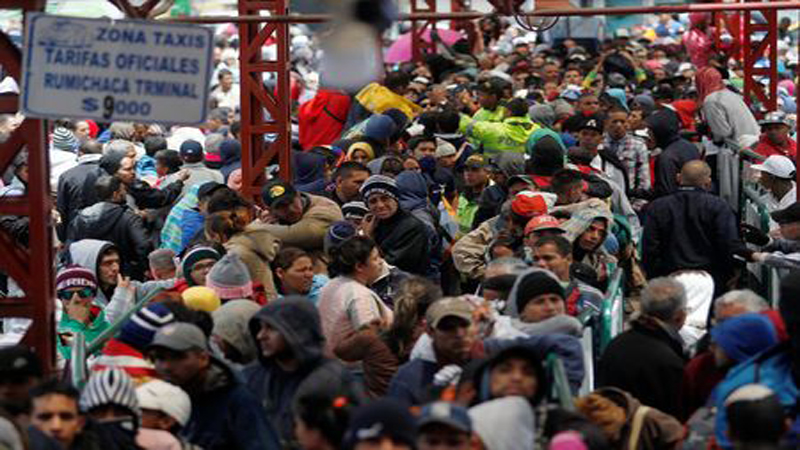Ecuador tighten entry for Venezuelan migrants
August 20, 2018 | Expert Insights

Ecuador has brought in new rules to stop Venezuelan migrants entering the country without a passport, leaving many stranded in neighbouring Colombia.
Background
Venezuela is rich in oil. It has the largest proven oil reserves in the world. But it is arguably precisely this wealth that is also at the root cause of many of its economic problems. Venezuela's oil revenues account for about 95% of its export earnings.
When socialist President Hugo Chavez was in power, from February 1999 until his death in March 2013, he used some of that money to finance generous social programmes to reduce inequality and poverty. Two million homes have been created through a socialist government programme called Misión Vivienda (Housing Mission), according to official figures.
But when oil prices dropped sharply in 2014, the government was suddenly faced with a gaping hole in its finances and had to cut back on some of its most popular programmes.
Read more on our extensive analysis on the refugee crisis in Venezuela here
Analysis
Thousands of Venezuelans fleeing their country's economic and political crisis have been crossing into Ecuador from Colombia using only identity cards. Most are heading south to join family members in Peru and Chile.
As of 12 a.m. on Saturday, new regulations were put in place by Ecuadorian President Lenin Moreno prohibiting Venezuelans from entering Ecuador without a valid passport. Previously, they could enter with no other document than their national ID cards.
Now, Venezuelan migrants’ queue in line to register their entry into Ecuador at the International Bridge Rumichaca. Colombia has protested against the move, saying vulnerable people will be trapped on its side of the border.
In a separate incident, residents of a Brazilian town attacked a Venezuelan migrant camp on Saturday and drove the occupants back across the border.
Venezuela has suffered for years from high inflation and the chronic shortage of food and medicines. More than a million Venezuelan migrants have entered Colombia in the past 15 months, according to official estimates, and more than 4,000 have been arriving at Ecuador's border every day. Many have been walking or hitching rides for weeks, and are exhausted by the time they reach the frontier.
With the flow of Venezuelan migrants causing tensions across the region, Peru's government announced immigration measures similar to Ecuador's on Friday. Passport requirements for Venezuelans will begin on 25 August.
In February, Colombian President Juan Manuel Santos announced a tightening of border controls, resulting in thousands of Venezuelans rushing to crossing points. Brazil, which neighbours Venezuela, has also expressed concerns and temporarily closed the border earlier this month. Violence has flared in the border state of Roraima where thousands of Venezuelans live in precarious accommodations.
The Pentagon is preparing to dispatch a hospital ship to Colombia and possibly other parts of South America to help relieve strain on health care systems overloaded by an influx of hundreds of thousands of Venezuelans who have fled that crisis-laden nation, Defense Secretary Jim Mattis said Friday.
Assessment
Our assessment is that many of the policies introduced by Hugo Chavez including capping of prices to make basic goods affordable have backfired as companies no longer found it profitable to produce these items locally, driving them out of business. We feel that these populist policies along with the fall in oil prices and concomitant hyperinflation have resulted in a precarious economic condition, triggering the exodus of people.








Comments